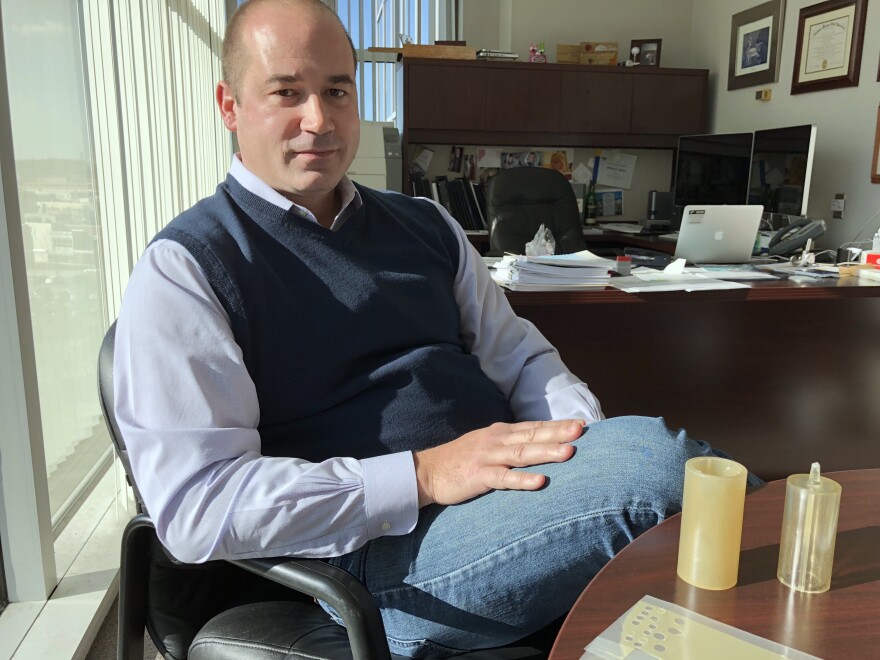One way the state of Ohio is trying to combat the opioid crisis is by funding new technologies to prevent addiction.
Last month the University of Akron shared in $10 million in state grants as part of that initiative.
On this Week’s Exploradio, WKSU’s Jeff St.Clair looks at how a personal experience with opioids inspired a local researcher’s quest for new methods of pain relief.
Our nation's problem with pain management hit University of Akron polymer scientist Matthew Becker recently when his wife had laparoscopic surgery.
“I took her home from the hospital," he says, with a prescription that called for 60 pain meds. "She took one,” says Becker.
Before stricter prescribing limits took effect in 2017, Ohio pharmacies were handing out more than 260 million opioid pills per year for acute pain, part of 750 million overall annual opioid doses.
The flood of pain meds fed an epidemic of abuse.
In 2016, three-fourths of fatal opioid overdoses were from people initially prescribed the drugs.
Becker believes there’s a better way to deal with post-operative pain.
Polymer pain relief
He lays out a ribbon of stiff plastic coated with a thin layer of a special polymer called polyester urea.
“These are degradable polymer films that we’re using as some of our initial pilot materials," says Becker.
The dissolvable polymers are loaded with non-opioid drugs that are inserted after a surgical procedure.
Becker had worked with pharmaceutical giant Merck on a previous project and came back to them with his idea to imbed pain-killers in plastic. He asked, “are you doing anything in pain?" And they said, "‘We’re Merck. Of course. We have thousands of compounds.’”
Together they settled on seven non-opioid drugs to experiment with.
“So something as simple as lidocaine all the way up the spectrum to proprietary compounds.”
A better degradable polymer
It’s not necessarily a new idea. Researchers have been experimenting with different types of plastic to deliver drugs, with varied success.
But Becker says some of those polymers degrade into acidic by-products, "and those acidic by-products can interfere with the tissue. They cause inflammation, and sometimes they can interfere with the drugs themselves.”
Becker avoids these problems by using the polyester urea, polymer that is metabolized by the body over the course of a few days into the simple components carbon dioxide, amino acid and urea which are reabsorbed or eliminated by the body.
And more importantly, he says, his polymer doesn't interfere with the imbedded pain-killing medications.
The need for post surgical pain relief
Instead of treating the whole patient with pain meds, Becker says the medicated polymer mesh is targeted pain relief.
“When you’ve got the ability to put in the mesh and control pain locally that’s probably a better option than systemic opioid relief,” he says.
It’s a big market.
“It’s hundreds and hundreds of thousands of surgeries a year,” says Becker. "And right now those people get a bottle of pills.”

Becker is hoping that by using previously approved drugs, he could get the green-light from regulators within a year’s time.
Dr. Anita Gupta, a pain specialist and a research fellow at Princeton University, says technologies like the one being developed in Akron are likely to be quickly adopted.
“These are products that will revolutionize the management of pain in the next 12 to 24 months,” says Gupta.
She says innovations in drug delivery give doctors much needed options for treating pain.
“Pain is subjective and everybody’s pain is different. And in all the thousands of patients I’ve treated, everybody’s pain is treated differently and everybody is case-by-case.”
The University of Akron’s Matthew Becker believes anything that reduces the need for prescription opioids is a step in the right direction.
Opioid technology challenge
The Akron-based company he co-founded, 21 MedTech, is coordinating the research. It, along with Merck, provided the required match to the $2 million grant from the Ohio Third Frontier Commission’s opioid technology initiative.
Ohio Development Services Agency Director David Goodman chairs the commission.
He says the challenge is “super-focused on technology to combat the opioid crisis so we can hopefully take care of two important things at the same time: 1) create jobs and help the economy and 2) save lives.”
Becker’s innovation is helping with those goals: 21MedTech is hiring 12 additional people to develop his polymer pain-killer product in Akron.







